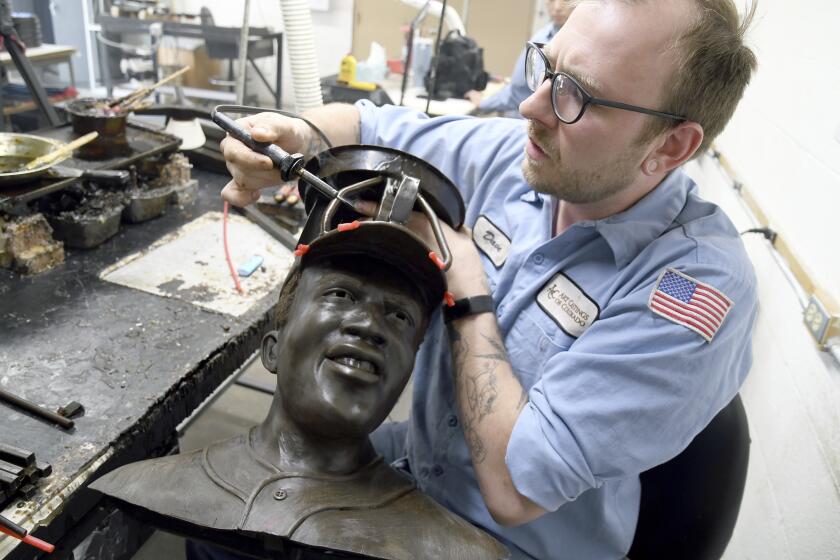Fantasy Baseball : So How ‘Bout Them Sludgers?
Before he put on his robe or read a legal brief--even before he left for the courthouse--the presiding justice of the California appellate court division in Santa Ana grabbed the sports page every morning to see how his team was doing.
There was a time when John K. Trotter Jr., of Division 3 of the 4th District Court of Appeal, would have been looking for the Dodgers’ or Angels’ box scores.
But since fantasy baseball entered his life, “the first thing we do is look to see how our team did, not how the Dodgers did,” said Trotter, who retired from the bench in August.
Trotter and his twin 14-year-old sons are the owners of a make-believe team in a league where their players’ performances are determined by the statistics generated by real baseball games. Through drafts and trades and other acquisitions existing only on paper, the Trotters amassed a team of stars including Oakland Athletics slugger Jose Conseco, Detroit Tigers shortstop Alan Trammell and Baltimore Orioles switch-hitter Eddie Murray.
Mushrooming Pastime
The Trotters are among hundreds of thousands of franchise owners engaged daily during the baseball season in the obsessive and mushrooming pastime of fantasy baseball, also known as “rotisserie baseball.”
Popularized by a succession of how-to books and fed by the seemingly limitless ability of personal computers to analyze and spew statistics, fantasy baseball has spread in recent years from big league metropolises to just about anywhere the mail can reach. Even Dublin, Ireland.
Although their teams exist only in baseball’s Twilight Zone, the owners--be they shoe clerks, peanut vendors or lawyers--can wield power like real baseball moguls. Many leagues print newsletters and hold annual meetings. Some owners even travel to real spring training sites to scout prospects. A cottage computer industry has grown to feed this fantasy fever by computerizing the record-keeping--for a fee.
Team Owners
Anyone is susceptible. Team owners in Trotter’s league include another appellate court justice, a retired judge, several lawyers and stock brokers and a public address announcer for California Angels games.
In a Waterloo, Iowa, league one owner who works for the city’s sewage disposal department named his team the “Louisville Sludgers.” A woman in San Francisco named Cookie calls her team the “Battermore Oreos.” And New York Gov. Mario Cuomo calls his “the Queens Alliance.”
What is it that drives otherwise conscientious, responsible adults to such flights of fancy?
“You have got to be a little bit weird to do it,” said the Rev. Gary Flanders, an Iowa Presbyterian minister and commissioner of the Waterloo Wotisserie League. Flanders regales his 1,400-member congregation with tales of his team, the Lake Wobegon Whippets, who by mid-season had taken “over sole possession of last place.”
“Other people in the congregation are making fun of us all the time,” Flanders said.
Glenn Waggoner, an Esquire magazine editor in New York, and a handful of other self-described baseball zealots founded the original Rotisserie League in 1980 in a Manhattan restaurant, La Rotisserie Francaise. There, they codified rules for what they call the “greatest game for baseball fans since baseball.”
“We have been absolutely dumbfounded at the way rotisserie league baseball has caught on,” Waggoner said. He attributes the increasing popularity to “a whole lot of people who have sat in the bleachers and grumbled that if we were running this ball club we’d . . . have a pennant or two.”
“This gives you a chance to put up or shut up.”
The game works this way: As many as 12 team owners form a league by selecting their players from actual Major League Baseball rosters. Rosters are about the size of major league teams--23 to 25 players--and one owner typically serves as commissioner to approve trades and resolve disputes.
Each team’s success is determined by how its players perform in real Major League games. The individual ballplayers’ home runs, pitching wins, batting averages and other statistics are ranked against players on the other make-believe teams. If Los Angeles Dodgers second baseman Steve Sax goes into a prolonged batting slump, it hurts the fantasy team owner who drafted him just as much as it hurts the Dodgers.
Owners can trade away deadbeats and drop underachievers in their continuing quest to assemble the perfect team.
Typically, in an eight-team league each team is ranked in eight offensive and pitching categories. For example, a first-place finish in home runs would earn eight points, while the last-place finisher would get one point. A good hitting team may earn eight points for ranking first in homers but only one point for finishing last in the earned run average category.
The team with the most total points wins. At the end of the year, the top finishers may even collect a modest pool of cash put up by all the owners.
But the emphasis is never on money, fantasy leaguers insist. What is really at stake are bragging rights.
“It allows (owners) to test their wits against others and really learn the game at a level they never felt possible,” Waggoner said.
Keith Olbermann, a sportscaster on Los Angeles television station KTLA, said he plays for professional growth.
“Professionally, I always considered myself knowing baseball backwards and forward, but now I can tell you the top stars in double A (minor league) ball . . . the stars for 1990,” Olbermann said.
“Plus,” Olbermann said, “it does become more important than life.”
For die-hards, there is no fantasy in fantasy baseball.
“In the other baseball, which we call Major League Baseball,” Waggoner said, “managers are being too timid to do anything, or in the case of the Dodgers, doing everything absolutely wrong.”
Fantasy leaguers routinely pester major league teams for the inside scoop on how long a player may be on the disabled list or whether a particular minor league prospect will be joining the big team.
“We seem to answer more rotisserie questions in this office than any other type of question, and we get calls from all over the country--New York, Boston, Texas,” California Angels publicist John Sevano said. “It keeps getting larger and larger.”
Actual Major League ballplayers, without whom the fantasy leaguers could not function, generally do not participate in fantasy leagues, according league and team spokesmen. “They are too busy,” Angels spokesman Tim Mead said.
But for fans who have the time, fantasy baseball “looks like an executive cerebral competition,” said clinical sports psychologist Richard Lister of Costa Mesa.
“That can be stimulating and can be healthy, providing it doesn’t get in the way of one’s job, family responsibilities, etc.,” he said. “It’s not that different from a mental standpoint from a guy getting up in the morning looking at the stock sheets, competing, trying to outsmart his opponents. . . . It’s very therapeutic.”
Fantasy leaguers also learn to view baseball games differently.
“I used to be an extremely big Dodger fan,” said John Snider, of Los Angeles, who in 1985 won a trip to the spring training camp of his choice by finishing first in a nationwide competition ranking hundreds of teams’ statistics.
“Now,” Snider said, “I’m an extremely big fantasy fan. If I have a pitcher (playing) against the Dodgers, I hope he shuts them out. My first love is with my players.”
Operating a fantasy league once meant hand-tallying the statistics, a tedious, time-consuming task. Moreover, someone had to print periodic reports so team owners would know where they ranked in the standings.
The emergence of personal computers has changed all that. Nevertheless, someone must operate the computer.
Jim Burger was pounding away on his personal computer keyboard on a Wednesday--the most critical day of the week--when his wife, Gloria, went into labor.
Use Home Computer
From their home in Chester, Pa., the Burgers and friend Steve Prentice operate FASTats, a statistical service for 42 fantasy baseball leagues nationwide. In a fraction of the time it would take 42 commissioners, the Burgers can type in the weekly stats published by USA Today each Wednesday and their computer can calculate league standings and print reports.
“Between contractions, she was reading the stats from USA Today,” Burger recalled. “She’d say, ‘Hold on, hold on, here comes another one.’ ” When the momentary muscle constriction would pass, he said, “we’d go on and do another team or two.”
“We were able to get through the whole National League and finished at 10:30 (a.m.),” he said. “Bridget was born at 3:30 in the afternoon at home. Quite a day.”
For their service, the Burgers charge $27 per team, plus $1.80 each time an owner trades, cuts or picks up another player. Burger, who also plays fantasy baseball (his team is “The Consultants of Swat”), began FASTats to supplement his regular job as a writing consultant. Now, he plans to make the statistics service a full-time job.
Services such as those the Burgers offer are on the rise.
‘Jumped on Bandwagon’
“I think when I started five seasons ago, there was only one competitor advertising,” said Larry Burris, whose company, Fantasy League Baseball in Seattle, provides statistics for 50 leagues. “In the Sporting News (classified ads) this spring, there were 20 to 25 others who jumped on the bandwagon.”
(The fantasy phenomenon is not restricted to baseball. Similar make-believe leagues exist for professional basketball and football.)
Most computer services remain small-scale, mail operations. But Heath Research of Virginia Beach, Va., and Computer Sports World of Boulder City, Nev., a database owned by the San Francisco Chronicle Publishing Co., are among a few that have begun providing statistics via telephone lines to customers with personal computers. A San Francisco firm, Ghost League Baseball, sells not only statistics but computer software enabling individuals to manipulate the raw data themselves.
Don Bennett takes full advantage of computerized services. He manages five teams whose stats are compiled by three different computer services.
Player in Ireland
Bennett has never set eyes on any of his competing team owners. That’s because the 48-year-old, Pennsylvania-born college sociology professor has lived for the last 17 years in Dublin, Ireland.
“I started out not caring too much about winning or losing, just . . . in manipulating the team, only to discover that winning is what it is all about for other people,” Bennett said. “I have become a little more oriented to the necessity of winning.”
Indeed, two of Bennett’s teams lead their leagues.
In gauging the market for Random House’s book, “How To Win at Rotisserie Baseball,” editor David Rosenthal estimated there are as many as 250,000 people playing the game.
“I don’t see any interest in the book waning; in fact I think it’s going to grow,” Rosenthal said.
Capitalizing on that trend, Random House printed more than 21,000 copies of its how-to book this year. Bantam Books has about 97,000 copies of its “Rotisserie League Baseball” in print.
‘Something Good’
“When you have the governor of New York playing rotisserie baseball,” Random House’s Rosenthal said, “you definitely have something good.”
Late this season, Gov. Cuomo’s team had fallen to eighth place in a 10-team league. His former press secretary, Martin Steadman, took responsibility for the dismal performance of their jointly owned franchise. Said Steadman: “I guess I’ve got a million excuses.”
All this obsessiveness can take its toll.
In “How to Win at Rotisserie Baseball,” author Peter Golenbock includes a chapter on “How to Keep Your Woman from Leaving You.” He offers this sage advice: “Get a second phone, get call-waiting, bribe her.”
Tyler Brown, a systems analyst for the Jet Propulsion Laboratory in Pasadena, has tried to persuade his wife that owning a fantasy team “is not like a night out with the boys.”
“I keep explaining to her that it’s better this than a mistress,” Brown said.
At an awards banquet in a Midway City hamburger joint about World Series time last season, Brown was to be named the “most dedicated owner.”
“But I couldn’t make it. It was a family matter,” he recalled. “My wife said if I wanted to keep having a family, I couldn’t go.”
Times staff writer Mark Landsbaum’s team in the Satchel Paige League sank from first to sixth in the final weeks of the just-concluded season.
More to Read
Get our high school sports newsletter
Prep Rally is devoted to the SoCal high school sports experience, bringing you scores, stories and a behind-the-scenes look at what makes prep sports so popular.
You may occasionally receive promotional content from the Los Angeles Times.






